Poverty-stricken Indigenous Australians should receive free relocation, training, and employment incentives, the New South Wales leader of the nation-minded One Nation party has said.
Mark Latham is proposing that NSW state government funding from the recently established NSW Aboriginal Land Trust could be used to help Aboriginal Australians who want to lift themselves out of poverty by providing relocation, education, job-training and employment subsidies.





